We Reviewed 10 of the Best Bizzabo Competitors & Alternatives

Bizzabo is one of the leading platforms in the corporate event industry.
There are a ton of great features under the hood (so many that the company refers to Bizzabo as an “event OS”), and they’re generally well-executed and received. But Bizzabo isn’t a perfect event planning tool—and some of its shortcomings will be deal breakers for serious event planners.
If that’s you, fear not! There are many other tools. And in this EventsAir guide, we’re introducing you to ten of our favorites.
But first…
Why Look for Bizzabo Competitors & Alternatives?
- Limited Customization: This is a big one for Bizzabo users. Many wish the platform gave them more control over the structure of events pages, workflows, and other design elements.
- Poor Attendee Experience: Another recurring issue is that many attendees find the platform difficult to use—a major hurdle for organizers who want to deliver a seamless event experience.
- Lack of Advanced Reporting: One final issue that gets mentioned quite a bit is the relatively limited reporting suite. This is an issue for data-driven planners, and it’s something many alternatives do better.
5 Best Bizzabo Competitors & Alternatives on the Market
- EventsAir
- Cvent
- Whova
- Eventbrite
- vFairs
- Webex Events
- RingCentral
- Eventtia
- Airmeet
- Dreamcast
1. EventsAir
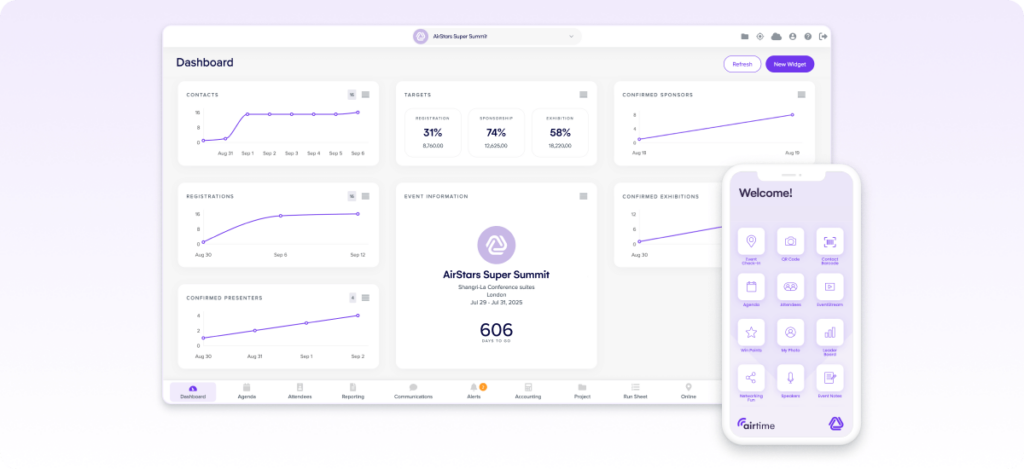
EventsAir is a comprehensive event management platform designed to streamline the planning and execution of events. EventsAir provides solutions for both virtual and in-person events, ensuring flexibility and scalability to meet the needs of various event types and sizes.
Key Features
- Attendee Management: Streamlines participant data with customizable fields and segmentation tools.
- Travel and Accommodation Management: Automates travel logistics and hotel bookings for attendees, speakers, and VIPs.
- Sponsorship and Exhibitor Management: Generates tailored sponsorship packages and tracks revenue and leads for exhibitors.
- Ticketing and Registration: Processes multi-tiered ticket sales with dynamic pricing and group discounts.
- EventsAir Pay: Facilitates secure online payments with multi-currency support and financial reporting.
- In-Person, Virtual, and Hybrid Event Support: Includes a comprehensive selection of on-site features including check-in and attendee engagement, as well as powerful virtual and hybrid support such as live streaming, online portals, and interactive 3D exhibition halls.
Pricing
EventsAir offers flexible pricing plans tailored to different needs. We offer three plans that support increasing numbers of users and events. Reach out for a quote based on your specific event management needs.
Pros and Cons
Pros
- Users like that the platform covers the entire event lifecycle, from initial event promotion, to registration and post-event reporting
- Many find the platform user-friendly, thanks to helpful drag-and-drop tools and a modern interface.
- The platform gets regular updates based on user feedback
Cons
- Slight learning curve due to its comprehensive feature set—but we offer great documentation and onboarding!
- No publicly disclosed pricing
2. Whova
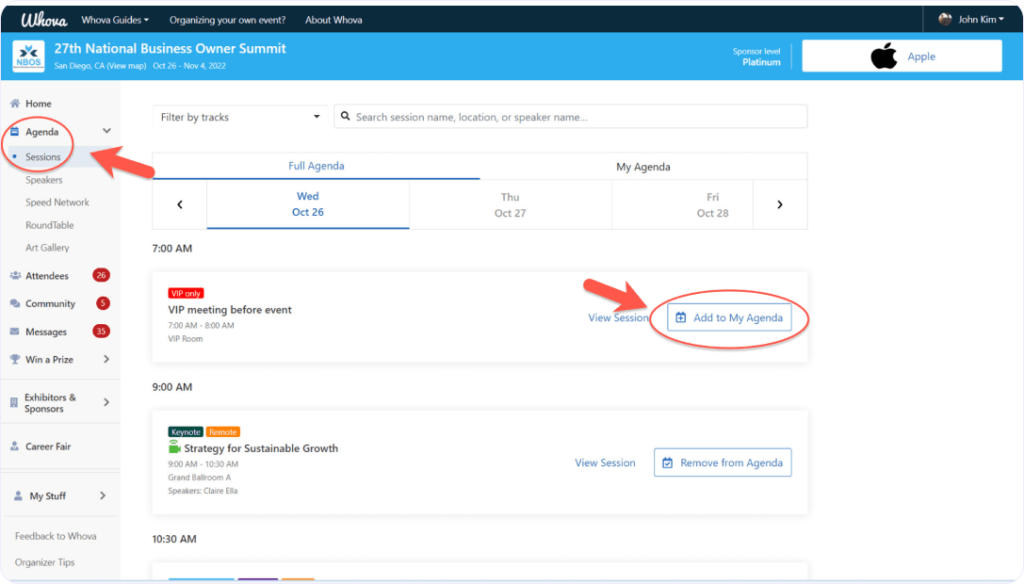
Whova is an all-in-one event management platform designed to simplify the organization and enhance the experience of both in-person and virtual events. It offers tools that cover every aspect of event planning, from registration and marketing to attendee engagement and post-event analysis.
Key Features
- Mobile Event App: Provides attendees with personalized agendas, live polls, messaging, and up-to-date event information.
- Event Registration and Ticketing: Streamlined processes for registering attendees and selling tickets, with support for multiple ticket types and pricing.
- Virtual and Hybrid Event Support: Features for hosting and managing virtual events, including live streaming, virtual booths, and networking tools.
Pricing
You’ll need to fill out Whova’s quote request form for up-to-date pricing.
Pros and Cons
Pros
- Comprehensive event management features
- Simple design for all skill levels
- Interactive tools enhance attendee engagement
Cons
- Initial learning curve due to feature abundance
- Limited customization options for specific branding needs
3. Eventbrite
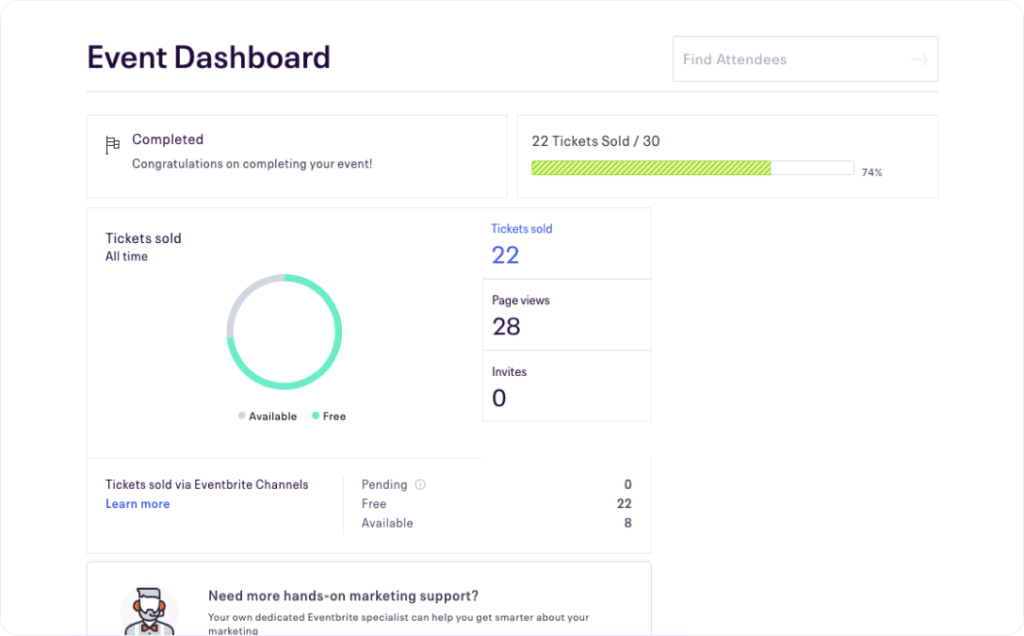
Eventbrite is an event management and ticketing platform founded in 2006. It helps organizers create, manage, and promote events of all sizes, from small gatherings to large festivals. With a global reach, Eventbrite has become a trusted tool for millions of event creators.
Key Features
- Customizable Event Pages: Creates branded event pages with flexible ticket types, custom questions, and dynamic pricing options.
- Attendee Management: Streamlines check-in processes with QR code scanning and provides real-time guest list updates.
- Event Discovery: Boosts visibility through Eventbrite’s marketplace and targeted email recommendations to potential attendees.
Pricing
Eventbrite offers a range of pricing plans for different needs. The Flex plan is free for up to 25 tickets, while the Pro plan is available for $29 per month, allowing up to 100 tickets per event.
For larger events, the Partner plan offers custom pricing with unlimited events and advanced support.
Pros and Cons
Pros
- Clean, intuitive interface
- Robust event creation and promotion tools
- Scalable for various event sizes
Cons
- Does not cover the entire event lifecycle
- Customer support issues
- Limited customization options
- Complex navigation for advanced features
4. Cvent
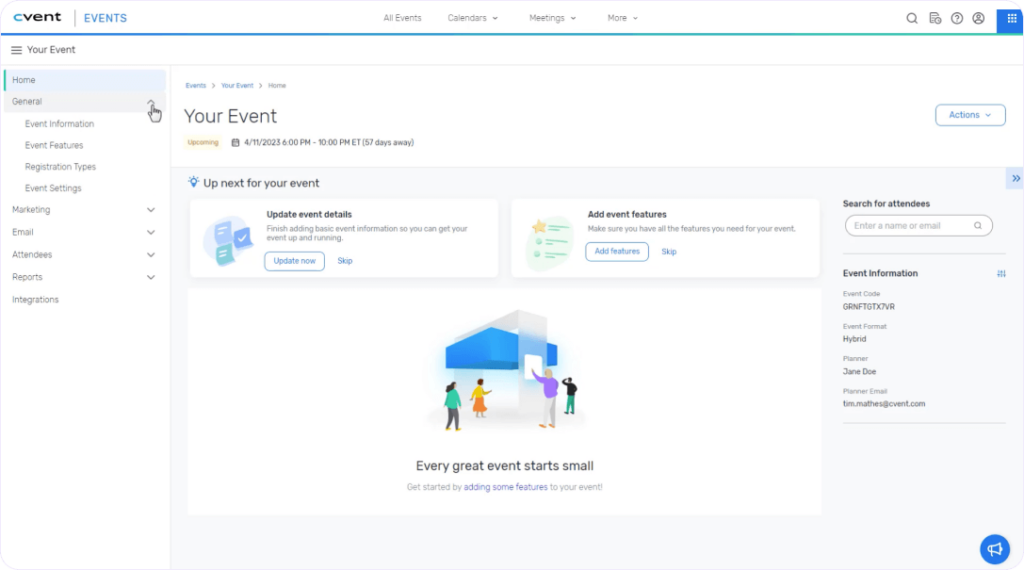
Cvent is a cloud-based event management platform designed to streamline various aspects of event planning and execution.
It serves a wide range of clients, from small businesses to large enterprises, offering solutions for both virtual and in-person events. Cvent is renowned for its robust feature set that covers the entire event lifecycle, from planning and registration to post-event analysis.
Key Features
- Attendee Management: Comprehensive tools for managing registrations, check-ins, and attendee engagement.
- Event Promotion and Marketing: Integrated email marketing, social media promotion, and event website creation.
- Reporting and Analytics: Detailed reporting capabilities to track event performance and gather insights.
Pricing
Cvent offers flexible pricing options with two distinct plans—Professional and Enterprise.
Pros and Cons
Pros
- Huge range of event management features
- User-friendly despite extensive options
- 24/7 customer support availability
Cons
- Hidden fees and unexpected charges
- Steep learning curve for new users
- Limited customization options
5. vFairs
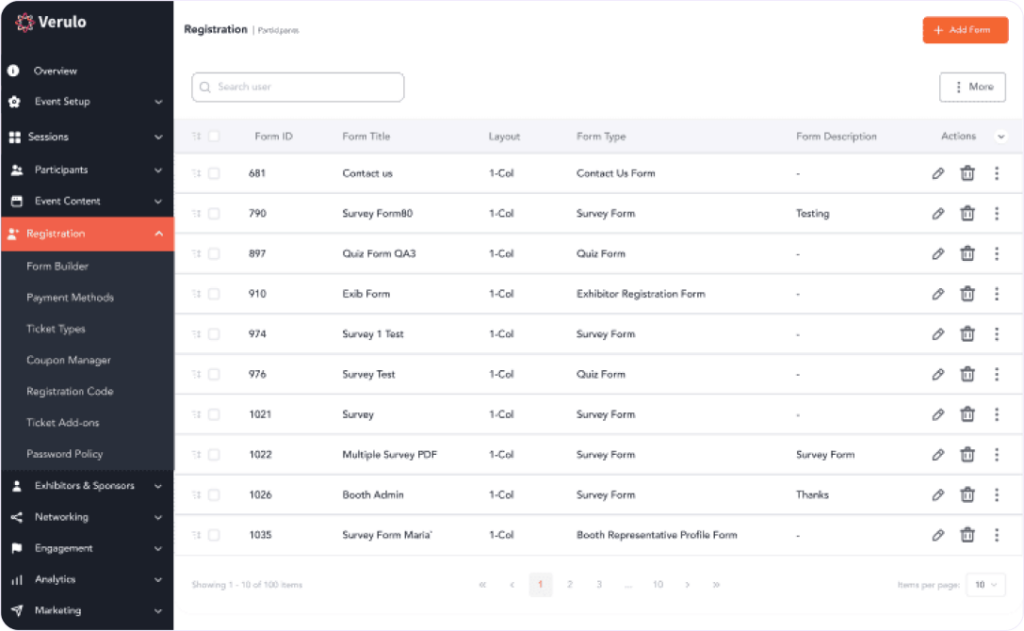
vFairs is a versatile event management platform designed to facilitate virtual, hybrid, and in-person events. Known for its robust customization and detailed analytics, vFairs aims to replicate the physical event experience in a virtual environment, making it a strong competitor in the event management space.
Key Features
- 3D Virtual Venues: Offers immersive virtual environments that can be customized to reflect a brand’s aesthetics.
- Webinars and Workshops: Supports live and on-demand sessions to facilitate learning and engagement.
- Networking Tools: Features like live chat, one-on-one meetings, and networking lounges to enhance attendee interaction.
Pricing
vFairs offers three tiered plans, all with bespoke pricing.
Pros and Cons
Pros
- Creates virtual environments matching the brand’s physical presence
- Comprehensive features streamline event management
- Strong reporting tools measure success and guide improvements
Cons
- Initial setup challenging due to feature complexity
- Limited real-time support during live events
6. Webex Events

Webex Events (formerly Socio) is a comprehensive platform that streamlines virtual, hybrid, and in-person events. The platform excels at delivering immersive event experiences while making event management straightforward and efficient.
Key Features
- Advanced Registration System: Create fully branded registration pages with multiple ticket types, pricing tiers, and group rates for seamless attendee sign-up.
- Interactive Event Apps: Develop custom mobile applications that give attendees instant access to schedules, maps, networking features, and real-time updates.
- Real-Time Analytics: Track attendee engagement, measure event performance, and gather actionable insights through comprehensive reporting tools.
Pricing
Contact Webex Events directly for custom pricing based on your specific event requirements. Pricing varies depending on factors like attendee capacity, event type (virtual, hybrid, or in-person), and required features.
Pros
- Clean, intuitive user interface
- Strong engagement features
- Excellent mobile experience
- Reliable technical support
Cons
- Learning curve for advanced features
- Limited third-party integrations
- Some customization restrictions
7. RingCentral

RingCentral Events is an AI-powered events platform that transforms virtual, hybrid, and in-person events into engaging experiences. The platform focuses on delivering professional-grade event management tools with extensive integration capabilities.
Key Features
- Complete Virtual Venue: Deploy comprehensive virtual environments with dedicated spaces for sessions, networking, and exhibitions that mirror in-person experiences.
- Integration Hub: Connect with over 40+ engagement apps (Kahoot, Slido, Miro) and 5+ MarTech platforms to create a seamless event ecosystem.
- Professional Studio Production: Access built-in production tools for high-quality event streaming and content delivery with professional-grade results.
Pricing
RingCentral Events pricing starts at $1,490 per license per year for up to 1,000 attendees per event.
Additional tiers are available for 2,000+ attendees. Organizations can save up to 16% by choosing annual billing over monthly payments. Contact RingCentral’s sales team for custom enterprise pricing and additional capacity options.
Pros
- Powerful AI-driven features
- Extensive app integrations
- Professional production tools
- Comprehensive analytics suite
Cons
- Higher price point than some competitors
- Can be complex for simple events
- Learning curve for new users
8. Eventtia
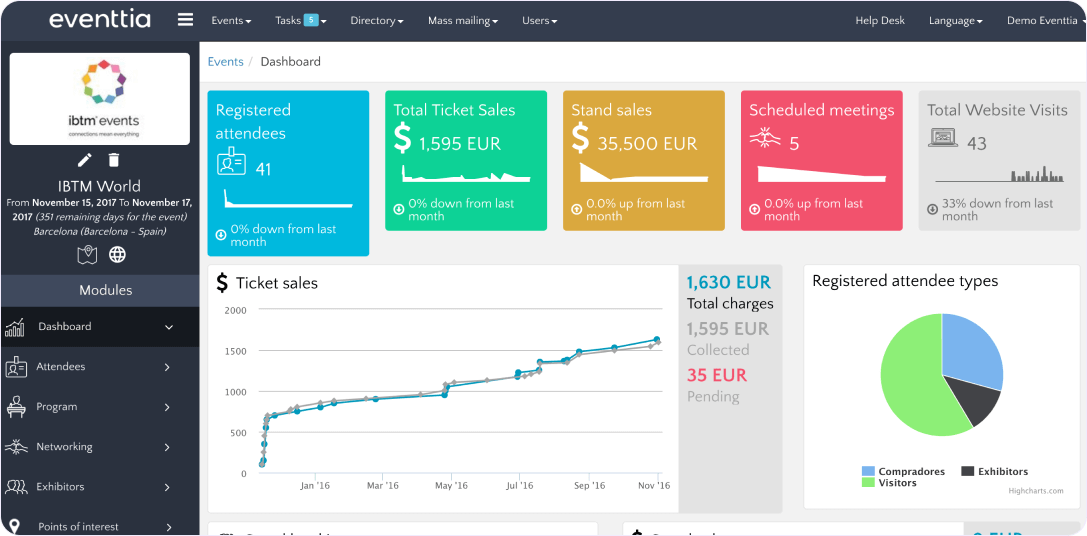
Eventtia provides a comprehensive event management platform for in-person, virtual, and hybrid events. The platform stands out for its B2B matchmaking capabilities and seamless integration of marketing tools with event management features.
Key Features
- Advanced Registration System: Create custom forms with multiple attendee types and automated payment processing while managing all registration workflows from a central dashboard.
- Event Marketing Suite: Deploy branded event pages and automated email campaigns to boost registrations and maintain consistent attendee communication.
- B2B Matchmaking: Enable targeted networking opportunities with sophisticated attendee matching and one-on-one meeting scheduling tools.
Pricing
Eventtia offers three distinct pricing tiers:
- Essential Plan: Starts at $1,250
- Premium Plan: Starts at $2,250
- Networking Plan: Starts at $3,500
All plans include unlimited events and per-attendee pricing.
Pros
- Robust B2B networking features
- Strong marketing automation tools
- Clean, professional interface
- Comprehensive reporting capabilities
Cons
- Some users report a learning curve
- Certain features may be limited based on the selected pricing plan
9. Airmeet

Airmeet is a versatile virtual and hybrid events platform that specializes in webinars, conferences, and community engagement. The platform excels at creating interactive online experiences with robust engagement features.
Key Features
- Social Lounge: Create immersive networking spaces with virtual tables where attendees can freely move between groups and engage in organic conversations.
- Interactive Sessions: Deliver engaging presentations with built-in Q&A, polls, and chat features that drive real-time participant interaction.
- Virtual Exhibition Tools: Enable exhibitors to showcase products and services through customizable virtual booths with integrated lead capture capabilities.
Pricing
Airmeet offers multiple pricing plans to accommodate different event requirements:
- Premium Webinars: Starts at $167/month (with 16% savings on annual billing)
- Events: Custom pricing based on requirements, includes free trial
- Managed Events: Full-service solution with custom pricing
All plans are scalable from 100 to 10,000 attendees and include corresponding team member allocations.
Pros
- Excellent networking features
- Intuitive user interface
- Strong engagement tools
- Flexible scaling options
Cons
- Some features limited to higher tiers
- Learning curve for hosts
- Video quality depends on connection
10. Dreamcast

Dreamcast is a comprehensive event technology platform that provides solutions for in-person, virtual, and hybrid events. With over 12 years of experience, the platform specializes in delivering end-to-end event management tools with a focus on seamless integration and customization.
Key Features
- Smart Registration System: Deploy efficient registration and check-in solutions that handle large-scale events with real-time updates and automated processes.
- Cashless Payment Integration: Enable secure, fast transactions with integrated payment processing that streamlines attendee purchases and vendor management.
- Customizable Virtual Environments: Create branded virtual spaces with interactive features including screen sharing, whiteboard tools, and live chat capabilities.
Pricing
Contact Dreamcast’s sales team for customized pricing based on event type, size, and required features. Solutions are available for various event scales, from intimate meetings to large conferences with 55,000+ attendees.
Pros
- Comprehensive tech suite
- Strong track record with major events
- Advanced customization options
- Robust payment processing
Cons
- Pricing not publicly available
- Complex feature set may overwhelm
- Setup requires technical expertise
Conclusion
Choosing the right event planning software can make a significant difference in the success of your events.
While Bizzabo is a popular choice, it’s worth exploring other options to find the best fit for your needs. EventsAir stands out as a top competitor, offering a comprehensive suite of tools, competitive pricing, and strong customer support.
Ready to simplify event planning and management? Contact sales for a demo and see EventsAir in action.



